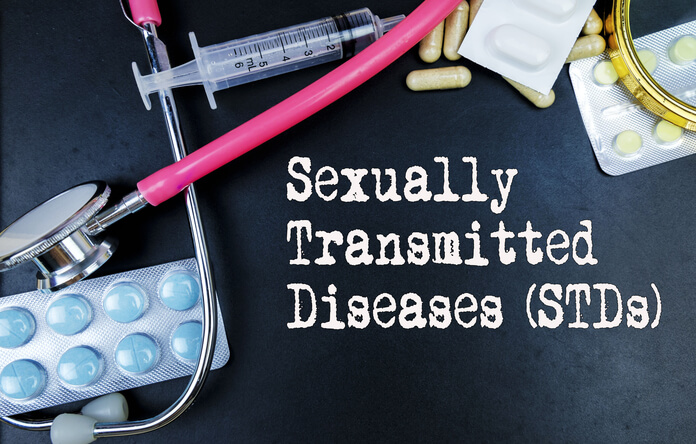Cinsel Yolla Bulaşan Enfeksiyonlar Nelerdir?
Cinsel yolla bulaşan enfeksiyonlar (STİ’ler) cinsel temas yoluyla yayılan hastalıklardır. Tanımlanan 100 yeni STİ’nin yaklaşık yarısı 24 yaşın altındaki ergen ve gençlerde bildirilmektedir. STİ’ler çok tehlikeli olabilir ve gençlerin sağlığını olumsuz alabilir. Ne yazık ki, ciddi sonuçlar üreme sağlığı, yani tubal kısırlık, sorunlu gebelikler vb. kadınlarda ve erkeklerde AIDS’i içerebilir. STİ’lere neden olan davranışsal faktörler güvenli olmayan cinsel davranış, sağlık hizmetleri davranışı ve uyuşturucu kullanımıdır. Benlik saygısı gibi psikolojik faktörler de gençlerde STI tanısını ve tedavisini etkiler.

Yaygın STI Türleri
Dikkat edilmesi gereken yaygın STI türlerinden bazıları şunlardır:
- HIV: Human Immunodeficiency Virus, or AIDS-causing agent, destroys the body’s immunity on having unprotected sex with an infected person, or using contaminated needles, or blood transfusion.
- HPV: Human Papilloma Virus is a common STI and seen as genital warts. HPV infection increases risk of cervical cancer in women. Pap tests can detect an HPV infection.
- Chlamydia: Chlamydial infections are characterized by abnormal genital or rectal discharge, burning sensation during urination, and rectal bleeding. In women, it can cause low belly ache and may lead to another disorder called pelvic inflammatory disease (PID). In men, we find urinary problems.
- Gonorrhoea: It causes painful urination or bowel movements, and may even lead to PID, ectopic pregnancy, and infertility in women.
- PID: This STI occurs in reproductive organs due to chlamydia or gonorrhoea. It causes infection of reproductive organs, thus leading to female infertility.
- Genital herpes: This STI is caused by herpes simplex virus (HSV) and manifests itself as a burning sensation which develops into painful sores in the vaginal or rectal area. Treatment is possible but relapses are common.
- Syphilis: Syphilis is a painless open sore or a rash around sexual organs in men and women. Untreated syphilis may lead to heart and nervous system disorders over time.
Diğer STİ’ler bakteriyel vajinozis, chancroid, Sitomegalovirüs enfeksiyonları, donovanoz), kasık bitleri, trichomoniasis, uyuz vb.
STİ’lere karşı koruma
STi’lerden korunduğundan emin olmak için uyulması gereken birkaç güvenlik önlemi vardır:
- Stay mutually monogamous with an uninfected partner
- Use a male latex or female polyurethane condom, even for oral sex.
- Reduce chances of getting HIV infections with preventive steps:
- PEP (post-exposure prophylaxis). Take HIV preventive medication within 72 hours of sexual contact.
- PrEP (pre-exposure prophylaxis). Follow strict medication regularly to prevent any HIV infection from sexual contact in future.
- Have regular medical examination for HIV and STIs.
- Avoid sexual contact with somebody who is HIV-positive, and make sure that the other person is taking their HIV medicines.
- Be aware of the symptoms of STIs and seek immediate medical help if any symptoms occur.
- Avoid douche as it reduces the pH of vaginal area making you more prone to infection.
Cinsel olarak aktif gençlerde STİ taraması çok önemlidir. STİ’lerin çoğu antibiyotiklerle başarıyla tedavi edilebilir. Uçuk gibi bazı STI’ler tamamen tedavi edilemez ve önlenebilir olan tekrarlayabilir. Sağlığınıza dikkat etmek ve belirtilerin farkında olmak tedavide çok yardımcı olabilir.


